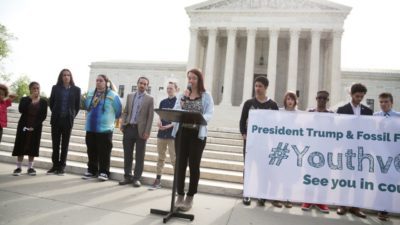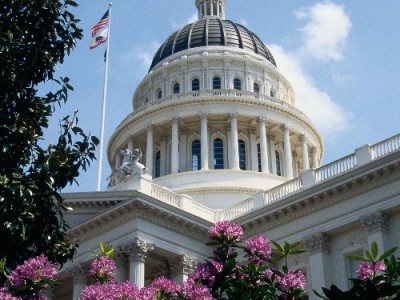statutory interpretation
Happy Birthday, Chevron Doctrine!
The Chevron doctrine has been a keystone of administrative law. But now it’s under siege.
Thirty-six years ago today, the Supreme Court decided the Chevron case. The case gives leeway to agencies when their governing statutes are unclear or have gaps. It’s probably the most frequently cited Supreme Court opinion ever. But now the Chevron doctrine is under fire from conservatives, who used to be its strongest advocates. Here’s how …
Continue reading “Happy Birthday, Chevron Doctrine!”
CONTINUE READINGPrinciples of Climate Governance
We need to address the procedures and structures for climate policymaking.
There’s a lot of discussion about the substance of climate policy today. That’s obviously critical, but we also need to think about the procedural and institutional issues involved in making climate policy. For instance, we need to think about how to divide authority between the states and the federal government. I thought it would be …
Continue reading “Principles of Climate Governance”
CONTINUE READINGJustice Stevens and the Rule of (Environmental) Law
A simple but powerful principle: courts and agencies should respect statutes.
Justice Stevens and the Rule of (Environmental) Law There’s already been a lot written in the aftermath of Justice Stevens’s death, including Ann Carlson’s excellent Legal Planet post last week. I’d like to add something about an aspect of his jurisprudence that had great relevance to environmental law: his belief in the rule of law, …
Continue reading “Justice Stevens and the Rule of (Environmental) Law”
CONTINUE READINGWhat’s Wrong with Juliana (and What’s Right?)
The odds against the “children’s case” are bad and getting worse. But there’s a valid insight at its core.
Juliana v. United States, often called the “children’s case,” is an imaginative effort to make the federal government responsible for its role in promoting the production and use of fossil fuels and its failure to control carbon emissions. They ask the court to “declare the United States’ current environmental policy infringes their fundamental rights, direct the …
Continue reading “What’s Wrong with Juliana (and What’s Right?)”
CONTINUE READINGSeparated at Birth? No, not really.
Trump’s pro-coal EPA plan equates two legal provisions with little in common.
Trump’s plan for coal-fired power plants, like Obama’s plan to cut carbon emissions, is based on section 111(d) of the Clean Air Act. But much of the legal argument relies on an analogy to section 165 to support EPA’s very restrictive interpretation of section 111(d). It’s that restrictive interpretation that leads the agency to reject …
Continue reading “Separated at Birth? No, not really.”
CONTINUE READINGThe Chevron Doctrine: Is It Fading? Could That Help Restrain Trump?
The Supreme Court may be shifting the rules for reviewing agency interpretations of statutes.
In June, the Supreme Court decided two cases that could have significant implications for environmental law. The two cases may shed some light on the Court’s current thinking about the Chevron doctrine. The opinions suggest that the Court may be heading in the direction of more rigorous review of interpretations of statutes by agencies like …
Continue reading “The Chevron Doctrine: Is It Fading? Could That Help Restrain Trump?”
CONTINUE READINGThe Anthropocene and public law
Major doctrinal changes could occur in constitutional law, administrative law, criminal law
In this post, I will discuss ways in which the Anthropocene might affect public law doctrines, focusing on constitutional law, administrative law, statutory interpretation and criminal law. Again, the changes here are driven by three characteristics of the interaction of the Anthropocene with the legal system that I have developed in my prior posts: a …
Continue reading “The Anthropocene and public law”
CONTINUE READINGEverything You Always Wanted to Know About the Chevron Doctrine
This doctrine, formerly known only to specialists, will play a large role under Trump.
During the Gorsuch nomination, there was a lot of talk in the press about the Chevron doctrine. Most people have never heard of this doctrine, and only a few are aware of all the nuances. As the Trump Administration’s rulemaking efforts come before the courts, we’re going to be hearing a lot more about it. …
Continue reading “Everything You Always Wanted to Know About the Chevron Doctrine”
CONTINUE READINGDueling Laws and the Clean Power Plan
EPA has shifted its position toward more readily defensible ground.
One of the most serious legal challenges to EPA’s Clean Power Plan — and probably the only one that could completely derail it — involves an exceptionally abstruse legal issue. When Congress tried to amend an obscure part of the Clean Air Act, someone screwed and two different versions were included in the final law. That …
Continue reading “Dueling Laws and the Clean Power Plan”
CONTINUE READINGDistrust of Congress (And Why It Matters)
It’s easy to joke about Congress’s public ill-repute, but it’s a serious problem.
A recent poll shows that public approval of Congress is still in the basement (though perhaps not flat on the floor, as it was before). This graph shows the trends: But this poll on public “approval” doesn’t tell the whole story. Here’s one that asks instead whether Americans have confidence in key institutions: The configurations …
Continue reading “Distrust of Congress (And Why It Matters)”
CONTINUE READING








